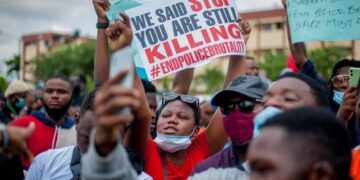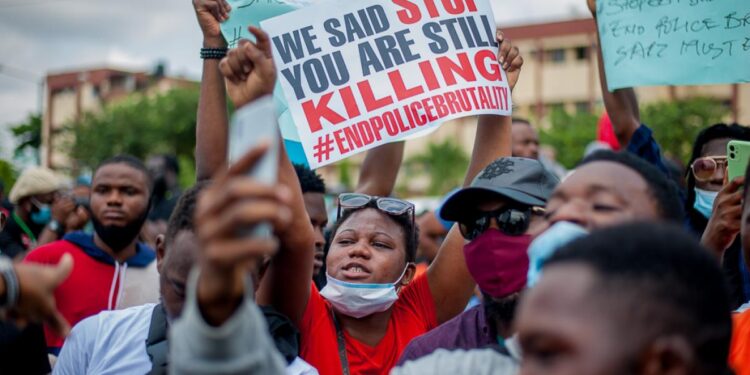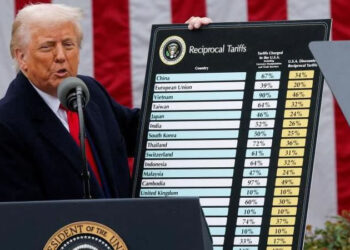By Olusegun Adeniyi
Initial election returns seemed to be going Donald Trump’s way until absentee ballots were being counted. And nobody was sure how he would respond to the change of fortune that put his vote tally behind that of former Vice President Joe Biden in key battleground states. So, when the president scheduled a press conference for prime time last Thursday evening, Americans were glued to their television sets. A few seconds into his rant, the anchor of MSNBC interrupted the broadcast. Other major networks except CNN and Fox News did the same. Nicole Carrol, USA TODAY editor-in-chief would later explain: “President Trump, without evidence, claimed the presidential election was corrupt and fraudulent. We stopped the live stream of his remarks early and have removed the video from all our platforms. Our job is to spread truth—not unfounded conspiracies.”
For CNBC, another major network that similarly cut off the US president midstream, it was former Fox News anchor and Trump supporter, Shepard Smith who took the decision.
“Never in my 30-year career have I ever interrupted a president of the United States”, said Shepard, “We’ve held back from doing so over and over and over while others have.
But if any other human being were using our platform of influence to lie to our viewers, we would stop them. And frankly, enough’s enough.”
The clear message from that episode is the responsibility the media has not only to hold people in power accountable but also to serve as a check on their excesses. But were such to happen in Nigeria under the present circumstances, the National Broadcasting Commission (NBC) that could penalize media houses for covering street protests would likely contemplate their permanent closure for “unprofessional coverage” of a presidential broadcast. That is the only way to explain the unfortunate actions already taken by the federal government and others being considered in the wake of the EndSARS protests that was hijacked by hoodlums.
I understand where the federal government is coming from. The 51-page pictorial report of the destruction in Lagos is frightening. It will take the state several years to recover from the devastation that must run into hundreds of billions of Naira. Many other states have also been counting human and material losses. This level of criminality and choice of targets could only have been premeditated and well planned. That is why the security agencies should be meticulous in their investigations. If the attempt is to seek justice, they will get to the root of that violence. But it would seem that what some seek is to exact vengeance, evidenced by the ongoing clampdown on EndSARS protesters.
It is unfortunate that a protest over genuine grievances not dealt with for years ended the way it did. But that is not enough to scapegoat or trample on the rights of innocent citizens. I am even more disturbed that the Central Bank of Nigeria (CBN) would be dabbling into an arena of politics by freezing bank accounts of protesters. Let’s be clear.
The Nigerian Financial Intelligence Unit (NFIU) can raise a suspicious transaction report (STR) on inflow into any bank account if there are grounds that the money is tainted.
From my understanding, a post no debit (PND) can even be placed on such account for 72 hours by the NFIU without a court order. But in all these, I am yet to see the role assigned to a regulator which the CBN is to the banking sector.
To protest in a democracy cannot be a crime. It is indeed a measure of how tolerant Nigerians are that the EndSARS protests took so many years in coming. Testimonies from state judicial panels are heart rending. A woman had her three sons killed by SARS operatives. A man had his tooth brutally removed with scissors. Another woman had the nozzle of a gun inserted into her private parts. It is obvious that many of the personnel in this notorious unit learnt their tricks from Luca Brasi, personal enforcer of Vito Corleone, the central character in Mario Puzo’s classic, ‘The Godfather’. But now you hear of passports of young Nigerians who protested against these brutalities being seized and denied their rights to travel while others are being arrested. On top of all this is the crude attempt to gag the media.
The move against the media is of course not a new gambit. But fallout from the EndSARS protests has provided a perfect excuse for such an anti-democratic stance. Since 2017, Information and Culture Minister, Alhaji Lai Mohammed has been obsessed with the idea of regulating or banning social media from the Nigerian landscape. He has only just added television stations to the brief with his NBC henchman running an embarrassing campaign of calumny and teaching journalists how to do their job. “When we went to China, we could not get Google, Facebook, and Instagram. You could not even use your email in China because they made sure it is censored and well regulated,” Mohammed said last week while rationalizing the federal government decision to ‘regulate’ social media.
Before I deal with the substantive issue, here are facts about the strict internet restrictions in China that the minister may not be aware of. In China, there are indigenous companies such as Alibaba for e-commerce (i.e. Amazon), Baidu for search engine (i.e. Google), Weibo for microblogging (i.e.Twitter) while WeChat is their own response to WhatsApp. To counter YouTube, China has Tudou and Youku. And in case the Information Minister does not know, TikTok with which young people all over the world send short-form videos originates from Beijing. So, beyond the issue of ‘national security’, there are hundreds of billions of dollars in financial gains and millions of local jobs accruing to China for its decision on Western social media. China knows what it is doing. On the contrary, to shut out these apps in Nigeria (assuming we have the capacity) will send hundreds of thousands of our young people out of jobs and deny them the creativity that sets our country apart on the continent. And to contemplate that in a post-covid world will be suicidal.
Beginning from October 2000 when I covered the first Sino-African conference in Beijing, I have been to China eight times and on no occasion was I unable to access emails. Besides, while China may have ‘banned’ Western social media platforms, they are not inaccessible in the country. So, if the idea is to spend billions of Naira to acquire obsolete gadgets to jam social media in Nigeria, it will be a waste of time and money. The generation of Nigerians that the Information Minister is dealing with are decades ahead of him. Perhaps the country he has in mind is North Korea which by the way I also had the privilege of once visiting. But since he is focused on China, let me break that down: Through the use of a virtual private network (VPN) that is available for free download, anyone can bypass the Chinese ‘Great Firewall’ and the same will happen in Nigeria. VPN not only masks internet protocol (IP) address making online actions virtually untraceable, it configures phones to show a different location. It is therefore an open secret (and the authorities in the country are quite aware) that Twitter, WhatsApp and the likes are easily accessible and are accessed by smart people, even in China! Next time the Honourable Minister is going to Beijing he should consult me.
I have already written about my disappointment and sadness over the violence that followed the highjacked EndSARS protests. I also made my position clear regarding mistakes made by our young people for which abuse and name calling came in torrents. But while we should deplore polarizing rhetoric which pushes our plural society towards its delicate fault-lines, we must also come to terms with the fact that the youths of Nigeria have not had a fair deal. Though I must add that this predates the current administration and is a problem that has always been with us.
In 2009, there was a report on Nigeria that the authorities never paid attention to and is now coming back to bite us. Sponsored by the British Council and coordinated by David Bloom, Harvard Professor of Economics and Demography, the report predicted that by 2030 Nigeria would be one of the few countries in the world with an abundance of young people at a period most others would be left with aging populations. With the right policies, the report concludes, Nigeria could easily become one of the world’s leading economies; and with wrong choices, our young citizens would “become an increasingly disruptive force”.
The signs that we are not prepared to reap this demographic dividend are staring us in the face. Our public universities have been closed for eight months. We make no investment in education or health. The population of jobless graduates keeps growing. Out-of-school children in Nigeria are almost twice the entire population of Togo. It is therefore not too difficult to understand the pressures that fuel unrest at a time the economy is in a mess and we borrow to stay afloat. These are challenges we must grapple with and should be the priority of those in government. But I understand the frustration of the Information Minister. Just six years ago as spokesman for the then opposition party, he effectively deployed these same social media tools to assail then President Goodluck Jonathan almost on a daily basis. “Now that the ‘Change’ exponents have moved from the passenger’s side to the driver’s seat of government and their ammunition of ‘blame Jonathan’ propaganda is exhausted as an excuse for every challenge, Alhaji Lai Mohammed contends that social media is the problem. He may need to look at himself in the mirror”, I wrote last year.
What the current situation in our country demands is not draconian policies. This is the time to rally everybody in the task of rebuilding our country. What we see on social media is a reflection of what Nigeria has become. When a nation under enormous economic pressures is divided along partisan, sectarian, geo-political and ethnic lines as we are and frustrations by its young citizens grow by the day, social media only makes it easier for a thousand lies to multiply. Arresting young people and freezing their accounts for participating in protests while gagging the media is not the right way to go.
I hope it is not too late for the federal government to change course and embrace a more productive approach to tackling a problem that will not easily go away.




































